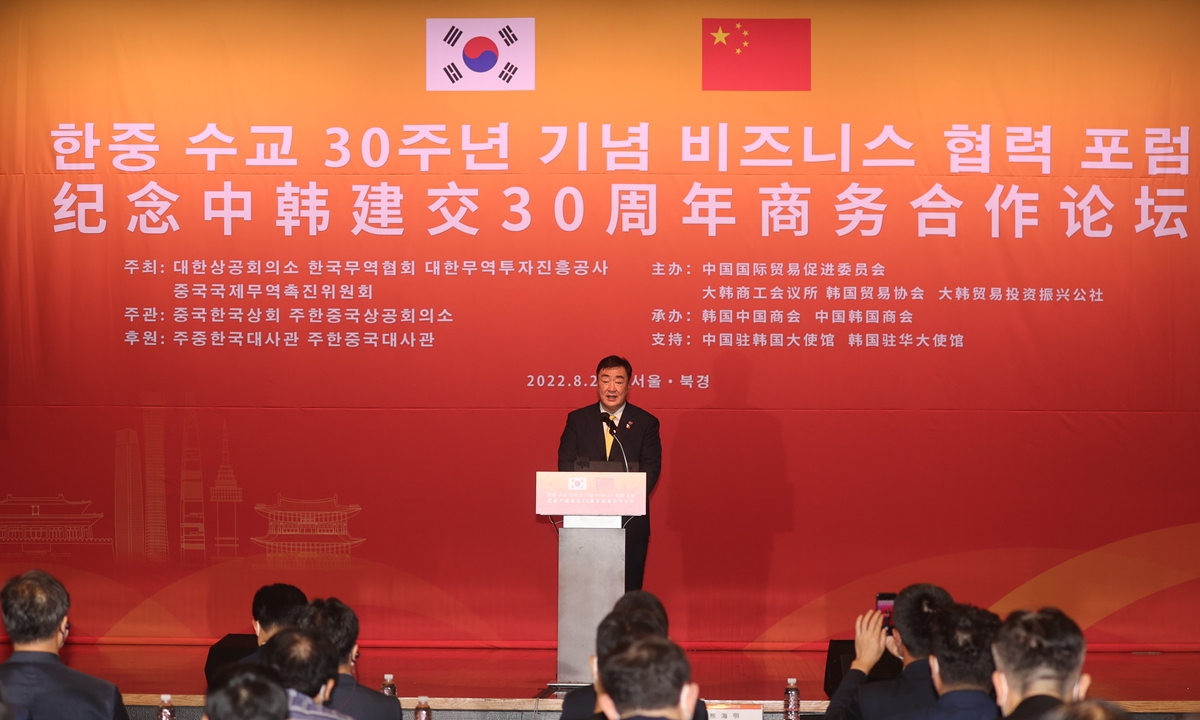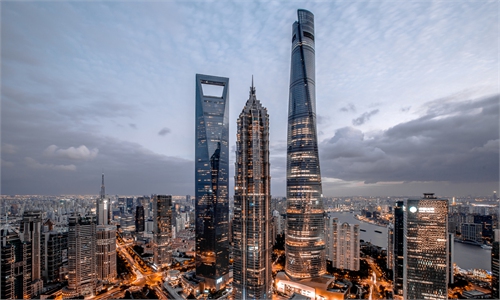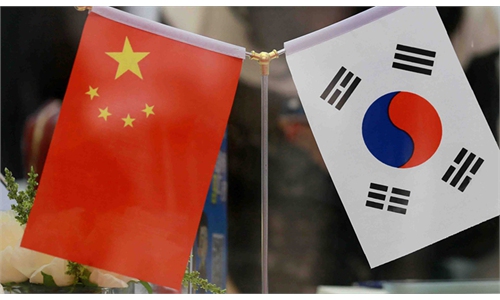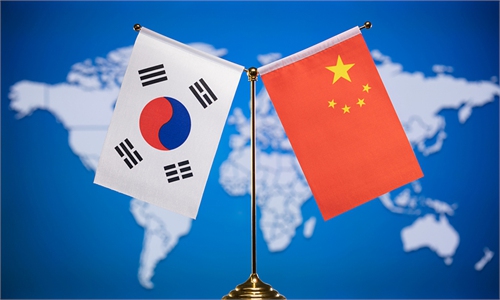
Chinese Ambassador to South Korea Xing Haiming delivers a speech in Seoul on August 24, 2022 at a forum marking the 30th anniversary of the establishment of diplomatic relations between China and South Korea. Photo: VCG
Chinese President Xi Jinping and South Korean President Yoon Suk-yeol exchanged congratulatory messages on Wednesday on the occasion of the 30th anniversary of the establishment of diplomatic ties between China and South Korea, speaking highly of the fruitful results reached by the two countries over the past three decades, which have benefited not only the two countries but also regional and global peace, and pointing out the direction for future development of ties.
In summarizing the experiences of making remarkable achievements in bilateral ties, Xi said that China-South Korea relations have developed because the two sides respect and trust each other, accommodate each other's core interests and major concerns, and enhance understanding and trust through sincere communication.
It is also because the two countries have insisted on openness and inclusiveness, and have worked together to safeguard regional peace and stability, promote regional integrated development, and preserve the basic norms governing international relations, Xi said, noting that those valuable experience above should be cherished with greater care and adhered to on a long-term basis.
The Chinese president also said that China and South Korea should be good neighbors, good friends and good partners, and he highly values China-South Korea relations.
Xi said he would like to strengthen strategic communication with Yoon and guide the two countries to take the 30th anniversary as a new starting point while grasping the general trend, eliminating disturbances, consolidating friendship and focusing on cooperation, so as to jointly create an even better future of bilateral relations and bring more benefits to the two countries and their people.
In Diaoyutai in Beijing, the same place Chinese and South Korean diplomats signed the protocol to establish diplomatic ties 30 years ago which helped end the Cold War-era hostility, representatives from different sectors gathered to celebrate the anniversary, looking forward to a more mature relationship between the two partners that share common interests in political, security and economic aspects.
The celebration in Beijing was carried on simultaneously with one in Seoul with Chinese State Councilor and Foreign Minister Wang Yi and South Korean Foreign Minister Park Jin meeting each other virtually and reading the congratulatory messages from the two heads of state.
Yoon said in the congratulatory message that it is hoped the two sides will explore a new direction for cooperation on the basis of mutual respect and will push forward the bilateral relationship toward a more mature status. It is hoped that the two countries will maintain close high-level exchanges and strengthen substantive cooperation in the supply chain and other areas of economic security and climate change, he said.
In addition, Chinese Premier Li Keqiang and South Korean Prime Minister Han Duck-soo also exchanged celebratory remarks.
Experts consider that the top leaders of the two countries have put forth an important message to the world amid global turbulence and a changing geopolitical landscape, and despite some obstacles in China-South Korea relations, the two countries are determined to continue developing bilateral relations. In terms of whether the future China-South Korea relationship will become more mature, the uncertainty comes from the South Korean side, on which Seoul needs to make cautious decisions, some experts said.
Important message to the world
Both leaders spoke highly of the bilateral relations over the past three decades and pointed out the future direction for cooperation in key areas such as politics, security, economy and culture, underscoring the will of the both sides to continue developing bilateral ties, and at this point, the two leaders have delivered an important signal to the world, Dong Xiangrong, a research fellow at the National Institute of International Strategy at the Chinese Academy of Social Sciences, told the Global Times on Wednesday.
Looking back at the 30-year China-South Korea relations, officials from both sides showed the courage and political wisdom of making breakthroughs in ending the Cold War hostility and finding a way to work together in spite of different political systems, social environment and ideologies. After upgrading the bilateral relations to a bilateral strategic partnership of cooperation in 2008, the two countries have enjoyed the dividends of close cooperation in trade, investment and people-to-people exchanges.
However, there have been frictions over the past decades, especially the dispute over the deployment of the Terminal High Altitude Area Defense (THAAD) anti-missile system announced in 2016 that severely damaged the bilateral relations.
Some South Korean media outlets such as the Korea Times and Seoul Shinmun said in articles amid a high celebratory atmosphere that bilateral ties are now at a crossroads, and they are unlikely to stay the same given the geopolitical upheaval surrounding the two countries. South Korea needs wisdom to coexist with China but the strategy of relying on the US for security and on China for its economy no longer works, according to South Korean media reports.
"I don't think the China-South Korea relations are at a crossroads as some South Korean media claimed. Although some issues emerged mainly due to the changing geopolitical environment, the bilateral relationship won't be derailed from its course," Dong said, noting that some issues could only accelerate or slow down this relationship rather than leading it in a completely different direction.
Also, the claim of relying on the US for security and on China for the economy is not always true, as on security issues like the North Korean nuclear issue, South Korea still needs to cooperate with China even though it has a strong partnership with the US on security, as China will continue playing a role in maintaining peace and stability on the Korean Peninsula, Dong said.
Most recently, with the South Korean government shift, the US ramped up efforts in pressuring South Korea by luring it to the US-led anti-China small clique such as the Indo-Pacific Economic Framework and "Chip 4." Also, Yoon snubbed US House Speaker Nancy Pelosi after she made a provocative trip to Taiwan in early August, which was seen by experts as a way to avoid an awkward meeting, as any country that plays a high-profile host to Pelosi who has just stirred up tensions across the Taiwan Straits could risk antagonizing China.
If there is political distrust between South Korea and China, it is not caused by the two sides, but by the US, as pressure from Washington could lead Seoul to undermine some core interests of China or cause divergences between Beijing and Seoul, Zhan Debin, director and professor at the Center for Korean Peninsula Studies at the Shanghai University of International Business and Economics, told the Global Times on Wednesday.
As a strategic partner, South Korea could probably ask China to cooperate on the North Korea issue while for China, both sides need to share some common voices on issues that may potentially threaten regional security and stability, Zhan said, noting that for example, South Korea should not follow the US or Japan in taking an anti-China position on matters such as the South China Sea and Taiwan.
"Also, the THAAD issue infringes on China's core interests and is our major concern. The message is actually telling South Korea that you should not deploy it," he said.
Eye on new opportunities
In an address in Seoul, Park, the South Korean Foreign Minister, said if the establishment of diplomatic ties between South Korea and China 30 years ago was the upheaval of the Cold War dissolution, then today, 30 years later, the world is once again ushering in a great transformation. The crisis in Ukraine has shaken the international order, and the line between security and the economy is becoming increasingly blurred, Yonhap News reported.
In the new global market environment, we need to upgrade the South Korea-China economic cooperation, conduct frank and sincere constructive dialogue, and strengthen strategic communication on outstanding issues, he said, urging that cultural and people-to-people exchanges need to resume soon.
Looking back on the past 30 years, South Korea-China relations have gone through many twists and turns, but they have always overcome difficulties through dialogue and communication and become more mature, media quoted him as saying.
South Korea's rarely seen trade deficit with China for three consecutive months and some anti-China sentiment in the South Korean society have caught public attention, as some South Korean observers and media outlets also called to reduce dependence on the Chinese market.
In the congratulatory messages on Wednesday with South Korean Prime Minister, the Chinese Premier said China is willing to deepen cooperation and exchanges with South Korea, pushing forward the strategic partnership. Han expects that the two sides will push forward the second phase of negotiations for the free trade agreement between the two countries.
Li mentioned that the two sides need to exclude interference. Experts said this means not only interference from the US but also interference caused by some unfavorable public sentiment in the two countries, as netizens of the two countries have been engaged in some online cultural spats in recent years.
For a more mature China-South Korea relationship, the uncertainty comes not from China but from South Korea, and South Korea-US relations if Seoul cooperates with the US on its regional strategies, Dong noted. "If political and security relations are damaged, economic ties will also be hurt. If South Korea is aware that its actions have complex consequences, it should be more cautious," she said.




